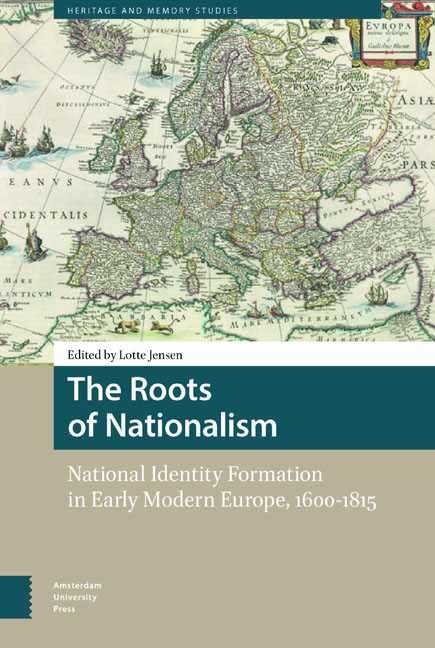Book contents
- Frontmatter
- Contents
- The Roots of Nationalism: Introduction
- Part One The Modernist Paradigm Contested
- Part Two The Genealogy of National Identity
- Part Three Negative Mirror Imaging
- Part Four Maps, Language and Canonisation
- Part Five Nation in the Age of Revolution
- List of Illustrations
- List of Contributors
- Index
16 - Singing the Nation: Protest Songs and National Thought in the Netherlands During the Napoleonic Annexation (1810-1813)
Published online by Cambridge University Press: 03 February 2021
- Frontmatter
- Contents
- The Roots of Nationalism: Introduction
- Part One The Modernist Paradigm Contested
- Part Two The Genealogy of National Identity
- Part Three Negative Mirror Imaging
- Part Four Maps, Language and Canonisation
- Part Five Nation in the Age of Revolution
- List of Illustrations
- List of Contributors
- Index
Summary
The study of protest songs has never played a major role in the historiography of the Napoleonic period in the Netherlands (1810-13). Until recently, the Napoleonic period, which ended the Dutch republic and introduced a modern monarchial and imperial system in Holland, has been interpreted as a period in which the Dutch population conformed itself to the Napoleonic reign. Extensive research in the archives by Johan Joor showed the need for reconsideration of this image of absolute passivity and apathy among the Dutch population. Lotte Jensen pointed to the need to include cultural sources in the study of protest against Napoleon. However, resistance songs – which served as a popular way of expressing discontent and protesting against the Napoleonic regime – have not been fully integrated into historians’ analyses. This is a pity, because police records show that, during the Napoleonic years, songs of a subversive and incendiary nature (des chansons remplies d’expressions séditieuses) were sung at many popular rallies and (spontaneous) protests. The French police took those songs very seriously and considered the composition and chanting of the songs as acts of resistance, thereby admitting that songs were a dangerous genre, directed against the stability of the Napoleonic regime.
In this article, I want to take a closer look at this singing culture during the Napoleonic years. I will limit myself to two specific subjects of turmoil in particular: conscription (or the draft) and the rumours that articulated the hope for the return of the house of Orange (and the restoration of Dutch sovereignty) in the last year of the annexation. My starting point is the assumption that songs were considered to have a big impact on society, based on their range and the significance of their content. The songs, many of which lamented the current circumstances, referred to Dutch sovereignty, freedom and the house of Orange. Therefore, they were part of a larger discourse of revolt and resistance in which an oral tradition of sedition played an important role. This discourse of resistance was present throughout the whole Napoleonic period, and ideas of (national) identity were continuously being formed in reaction to Napoleonic politics. The songs sung during the period show a clear shift in content over time, thereby anticipating new events.
- Type
- Chapter
- Information
- The Roots of NationalismNational Identity Formation in Early Modern Europe, 1600–1815, pp. 309 - 328Publisher: Amsterdam University PressPrint publication year: 2016



